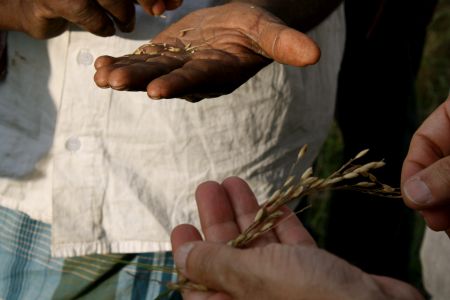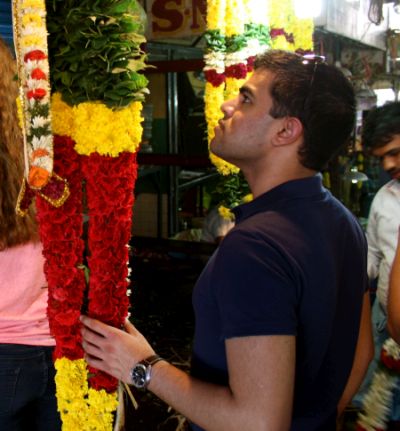by Erin Brennan & Grace Walsh, Juniors in Supply Chain Management at the University of Illinois at Urbana-Champaign
The following post was written by students on an ADM Institute-sponsored observation study tour through India.

Through interviews with farmers and on-farm demonstrations, students
learned how strongly family is emphasized in Indian culture.
Credit: ADM Institute/Kari Wozniak
Wrinkled from the sun and strong in stature, four-foot-ten Kalilamman sat down with us at the Market Place Literacy Community Trust (MLC Trust) to share her experiences.
Family is Everything
She smiled when she told us how proud she is of her four younger siblings, especially her brother who has earned a college degree. Kalilamman, who is now fifty-two, only attended school until she was ten years old, and spent the rest of her childhood assisting her father on the farm. When he passed away, Kalilamman was seventeen and she and her mother were left to provide for their family. While her sisters married, Kalilamman’s arranged marriage fell apart as she valued her family’s well-being more than her own, and couldn’t leave her siblings to provide for themselves. She has continued working her family’s land and has even adopted three of her sisters’ children so they could have the opportunity to work as well. All of her hard work and self-sacrifice aims to bring her big family of thirteen more resources, more education, and more opportunities.
Profiting from Hard Work

A student looks at garlands for sale at a Koyambedu Market where farmers like Kalilamman bring their crops
Credit: ADM Institute/Kari Wozniak
Kalilamman provides for her family by farming rice paddy and flowers. Paddy fields need to be flooded at all times, and if for any reason they dry up, the whole crop is lost. Even with a successful harvest, not all the strands of paddy will produce grains, so there is about 10% loss. Kalilamman is able to harvest twice a year, as rice has a 90-150 day crop season. She has no storage system, but says she has no loss from weather or pests. A wholesaler comes to her village and buys the paddy from her, and sells her product while taking a 12% commission. Kalilamman does not consider this middleman’s cut to take away from her profits because she still makes a modest profit. Many farmers, we found, have this same mentality regarding profit and how they affect losses.
Kalilamman’s bangles jingle as she points to her blue and purple-flowered sari while she explains her flower business. Flowers are more profitable than paddy and can be used in temples, women’s hair, and marriage ceremonies. After going to a MLC Trust training session, she learned that she could be more successful by marketing her product herself rather than working through a wholesaler. Her hard work isn’t wasted as she ensures that all of her flowers are sold. She now takes the flowers to the market herself each day, and says that although she still has about 10% loss, this is less than she had before and by cutting out the middleman she can make a lot more money.
Future of the Farm
Kalilamman is getting older, and does not know who will take over her farm when she no longer can, as the younger generations are moving away from farming and looking to take jobs in the city. She knows, however, that she does not want to sell the land. Education and the opportunities it opens up are very appealing to farmers like Kalilamman, so it is a difficult situation to want to keep the farm in the family and want the best for future generations. This means that her farm, like many others in rural India, may be gated off and unused for generations, decreasing the potential food supply for the country. Until that decision needs to be made, Kalilamman will continue to run her farm and produce a living for her family.
More about the trip:
- Illinois Students Gear up to Impact Global Food Security
- Following the Flowers: A First Look at Indian Supply Chains
- Losses Along the Way
- Taste of India
- Southern Indian Hospitality
Edited by: K. Wozniak/G. Kenney


No comments yet.